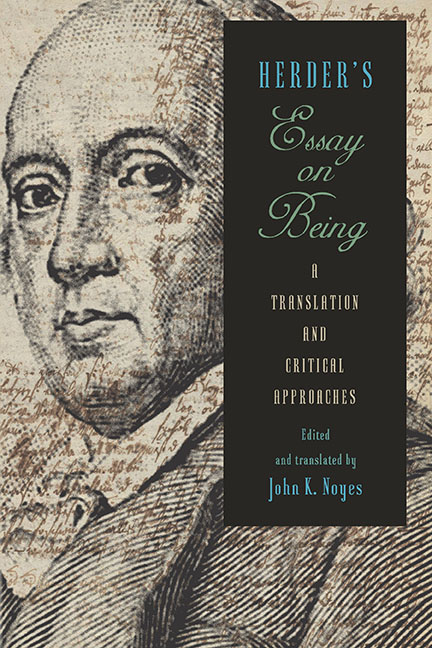Book contents
- Frontmatter
- Contents
- Acknowledgments
- List of Abbreviations
- Introduction: The Essay on Being
- Part I Versuch über das Seyn, by Johann Gottfried Herder
- Part II Critical Essays
- Herder's Essay on Being
- The Order of Being and the Order of Ideas: The Historical Context of Herder's Essay on Being
- Indivisible, Inexplicable, and the Center of All Certainty: Herder's Concept of Being
- The Metaphysical Foundation of Subjective Philosophy in Herder's Essay on Being
- Herder's Kantian Critique of Kant on the Concept of Being
- Attempting to Place the Essay on Being
- Herder's Early Neoplatonism
- Being, Possibility and God: A Comparison of Herder and Heidegger
- Bibliography
- Notes on the Contributors
- Index
Being, Possibility and God: A Comparison of Herder and Heidegger
from Part II - Critical Essays
Published online by Cambridge University Press: 13 April 2019
- Frontmatter
- Contents
- Acknowledgments
- List of Abbreviations
- Introduction: The Essay on Being
- Part I Versuch über das Seyn, by Johann Gottfried Herder
- Part II Critical Essays
- Herder's Essay on Being
- The Order of Being and the Order of Ideas: The Historical Context of Herder's Essay on Being
- Indivisible, Inexplicable, and the Center of All Certainty: Herder's Concept of Being
- The Metaphysical Foundation of Subjective Philosophy in Herder's Essay on Being
- Herder's Kantian Critique of Kant on the Concept of Being
- Attempting to Place the Essay on Being
- Herder's Early Neoplatonism
- Being, Possibility and God: A Comparison of Herder and Heidegger
- Bibliography
- Notes on the Contributors
- Index
Summary
Being
THE POSITIONS OF HERDER AND HEIDEGGER on the idea of Being, and on the relation between Being and thinking, are strikingly similar in a number of respects. Most fundamentally, as Karl Menges has pointed out, both philosophers emphasize the priority of Being to human thought and the basicness of the concept of Being. In the Essay on Being Herder writes that Being is “the foundation of all our thinking and the element in which we are immersed [umhüllt]” (FHA 1:14; EB, 64). Heidegger describes Being as “the transcendens pure and simple,” on the grounds that it “is no class or genus of entities; yet it pertains to every entity” (BT, 33; SZ 38). To be sure, these viewpoints are not identical, since Herder understands Being as the “most sensory” of concepts, the idea of a bare “something” based on sense experience (FHA 1:12; EB, 60), while Heidegger takes it to be the ultimate a priori, grasped in advance of every encounter with entities. Furthermore, Herder sees the concept of Being as obscure and unanalyzable because of its utterly “sensory” character. Heidegger clearly cannot believe the concept is in every sense unanalyzable, given that the explicit aim of Sein und Zeit (Being and Time, 1927) is “to work out the question of the meaning of Being and to do so concretely” (BT, 1; SZ 1). Such contrasts reflect divergent uses of the term “Being,” as well as distinct conceptions of the character and status of sense perception. Behind them, however, lies a broader agreement on the question, in Menges’ words, of “whether man projects his world himself or whether the world is given to him—whether, in philosophical terminology, consciousness determines Being or Being determines consciousness.”
Herder, Menges notes, “always decided for the latter answer with the greatest commitment.” Heidegger rejects the term “consciousness,” which he sees as necessarily picturing human existence in terms of a subjectivity that is supposed to be radically separable from the “world.” But in doing so he actually agrees with Herder's critique of idealist epistemologies that imagine the structures of the world given to human understanding as being a function of ideas projected by that understanding prior to, and independently of, any concrete engagement with the world.
- Type
- Chapter
- Information
- Herder's Essay on BeingA Translation and Critical Approaches, pp. 183 - 202Publisher: Boydell & BrewerPrint publication year: 2018



